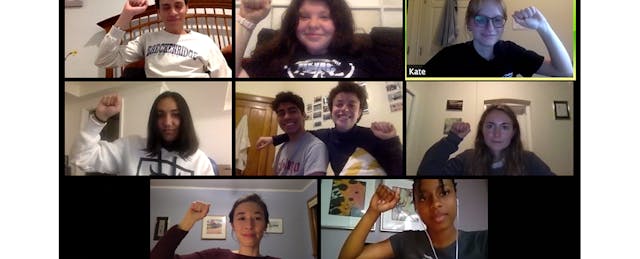Should colleges be giving students a partial refund on tuition since their campuses were forced to shift teaching online for the COVID-19 pandemic?
Some students think so, and lately their calls for refunds have been getting louder. Petition movements at more than 200 campuses are calling for partial refunds of tuition, typically asking for 50 percent back. And some student protesters are now even filing class-action lawsuits to try to force colleges to return part of the tuition money.
John Donners is a student leading the petition effort at the University of Illinois at Chicago, where more than 8,000 students have signed on. The school has around 21,000 undergraduates, meaning close to half the school’s students have already signed the petition.
Their demand is simple. Since the university typically charges less for online courses than face-to-face ones, the students want a refund for the difference. And they want a return of fees paid for facilities like gyms and other amenities that they couldn’t use during the lockdown.
“It really isn't the same quality of an education from my experience and the experience of many other students as this isn't what [we] signed up for,” Donners says. ”At the end of the day, we are paying for a service. And when you don't receive the service that you're promised, you should be given some sort of refund or compensation for the difference.”
But is it really that simple? Is college just like any other service, like dry cleaning or going to a restaurant? What are students paying for, and what are colleges really selling?
For this week’s episode of the EdSurge Podcast, we dive into the debate over tuition refunds during this sudden period of mass online education during COVID-19, when it’s simply not safe to do what we all took for granted just a couple of months ago, like sit in the back of a lecture hall with 300 other students.
Listen to this week’s episode on Apple Podcasts, Overcast, Spotify, Stitcher, Google Play Music, or wherever you listen to podcasts, or use the player below. Or read a short recap below.
Despite Donners’ petition, officials at the University of Illinois at Chicago are holding firm. As chancellor Micheal Amiridis said in a statement, “since UIC continues to teach all courses remotely, we have not considered a partial refund on tuition. However, we are considering a partial refund of the fees for interrupted services (recreation, student centers, student programming, athletics, etc.), as well as some lab fees associated with specific courses.”

This week’s podcast sponsor is Emporia State University’s online Elementary Education program: designed for career changers interested in becoming elementary teachers.
Know anyone who might be a good fit? Let us know here.
The move to refund some facilities fees admits that students are missing out on much of the campus experience that can’t be replicated online, like the gym and campus events. (We contacted UIC and asked for an interview for this podcast, but they didn’t get back to us by our deadline.)
The partial refund on fees hasn’t satisfied Donners and the other students pushing for tuition refunds, largely based on the argument that online education is just not as good and therefore worth less money.
But is the remote learning of the past few weeks significantly worse than the classroom teaching that was going on before COVID-19? And if it is worse, is it 50 percent worse? Even by the logic of this student protester, what is the right compensation?
I reached out to a professor at the University of Pennsylvania who studies higher education, Jonathan Zimmerman. He wrote a forthcoming book called “The Amateur Hour” about the history of college teaching in America.
“I don't think we know enough about how much students were learning under the face-to-face model to calculate what an alleged loss might be under this new model,” Zimmerman says. He adds there has been a “longstanding reluctance to try to figure out how much people learn,” and therefore “it's quite difficult, if not impossible, to figure out what sort of drop off there might’ve been with the introduction of online.”
Zimmerman has looked at the history of online education, and says that colleges have most often used it not as a replacement for face-to-face classes, but rather to attract new students who can’t get to a campus or afford traditional college.
“If you look at elite schools, like where I teach, there's very little online instruction. But if you go to the community college world or especially to the for-profit world, you find that often most of the classes are taught online,” he says. “Indeed, I would argue that up until this moment, face-to-face instruction was fast becoming a privilege. What's unique about our moment is everyone's been thrown into the same pool, and suddenly everyone has to do online, including people at the elite schools. And that's important because lo and behold, that's also the places where you see these petitions from students saying, we should get a tuition discount because this isn't as good.”
It’s true that the most aggressive student actions have come from some of the country’s most selective and elite universities. Students at half a dozen universities including Brown University, Duke, Vanderbilt and USC have filed class-action lawsuits against their universities. The complaints allege breach of contract for making the switch from in-person to online instruction.
The complaint against Brown refers to online learning as “a limited online experience presented by Google or Zoom, void of face-to-face faculty and peer interaction, separated from program resources, and barred from facilities vital to study.” Students, it claims, had signed up for a different—or better—experience.
But not all students asking for tuition refunds are doing so because of the online teaching issue.
At the University of Chicago, which is separate from Donners’ school and one of the most expensive private colleges in the country, students are calling for a 50 percent tuition reduction, and for greater transparency related to why things cost so much. Their main argument is that the well-endowed university was charging too much even before the pandemic.
“It's not about the like online classes,” says Julia Attie, one of the student leaders of the movement at University of Chicago. “This crisis is highlighting problems that already existed” around the affordability of higher education.
Jonathan Zimmerman, the professor who studies higher education, says that it is harder than students think for a college to just hand half of the tuition back from this past quarter.
“Nothing is free, and every discount has to be compensated with something else,” he says. “So how should they do that? I hope not by firing a sanitation worker or a cafeteria worker. It strikes me that one of the questions that you always have to address if you're talking about any kind of discount is: How was that pain going to be spread around?”
That is the argument that officials at the University of Chicago are making in their response to the student demands. We invited someone from the university to appear on the podcast but they declined. In an email statement by Provost Ka Yee Lee last month, he said that giving back tuition would mean “substantial cutbacks in operations, which would hinder the University's ability to provide all of its current educational offerings and to fulfill its core research and education mission.”
And he stressed that the University of Chicago is working to make emergency aid available to students in need during the crisis.
The university did do one thing recently that students have been calling for. They froze tuition for next year rather than raise it slightly as typically happens. To be clear, university administrators haven’t actually met with the student activists, and they may argue that they did this on their own rather than because students asked for it.
Nobody seems to be arguing, though, that the online education going on at colleges during this pandemic is as good as the face-to-face teaching that usually happens on campus. In part that’s because it was thrown together with haste, and even some students see that their professors did work hard and do their best under the circumstances.
But Zimmerman says that online education is often just not as good, even in the best of times.
“The most recent studies suggest that you don't learn as much online as you do face to face,” he says. “But one of the things we've discovered is that the drop off (between face to face and online) is greatest for people who are first gen students, working class students, minority students. This speaks to another massive inequality.” Namely, he says, those underprivileged students are more likely to enroll in online learning. “But within the online world, one of the things we've discovered is the less privilege you have, the less you learn.”
Still, Zimmerman stressed that he’s not against online education.
“That would be like being against air. I mean it's here,” he says. “But you know what, there's good air and bad air and that's the discussion that we should be having. Like, how can we use this tool in a way that benefits us—especially the least advantage among us—and how can we avoid using it in ways that don't help or even might harm?”
There’s another way to think about what college students are buying with their tuition dollars, though. The president of Brown University, Christina Paxson, told a reporter from The New York Times that students are still learning and the Brown degree retains its value.
In that way of thinking, maybe the biggest asset students are paying for with their tuition is the signalling function of the degree from whichever institution they graduate. In other words, the reason to go to Brown is as much about proving to employers that you got into Brown and could finish, than it is about the details of what kind of learning happened there.
I ran that idea psat Julia Attie, the student activist at the University of Chicago.
“That kind of exchange is not the way our campaign sees education,” Attie says. “This really is about students who are struggling and it's not about the fact that we get a fancy piece of paper that we're paying the same amount for.”
For her, the issue seems to be more about power and about who can afford to weather this financial storm.
“I have no doubt that universities are having to make financial changes during this time,” she says. “But just like after the 2008 financial crisis, I'm sure that University of Chicago will recover, and students who have had to take on debt will not. And I think that's one of the biggest differences.”
But for both student activists, one of their major demands is actually just a sit down with university leaders and more of a voice in how institutions are responding to the crisis.
“The students are much more than just a customer at the university,” says Donners. “I often think it's interesting to put in perspective of the students almost being like a shareholder because the students keep the university alive. There would be no university without the students.”
He complains, though, that students are not being consulted as the university makes plans to potentially reopen the campus in the fall. “The biggest thing that they continue to miss the mark on is including student voices and actually listening to the students as equals instead of just dictating to them what they think is best.”
Attie said something similar. These students want to be included during this crisis. In some ways, all these petitions and tuition strikes and lawsuits are an effort to be heard.
If nothing else, it will be interesting to see if this movement changes how willing colleges are to involve students in planning after the crisis.


